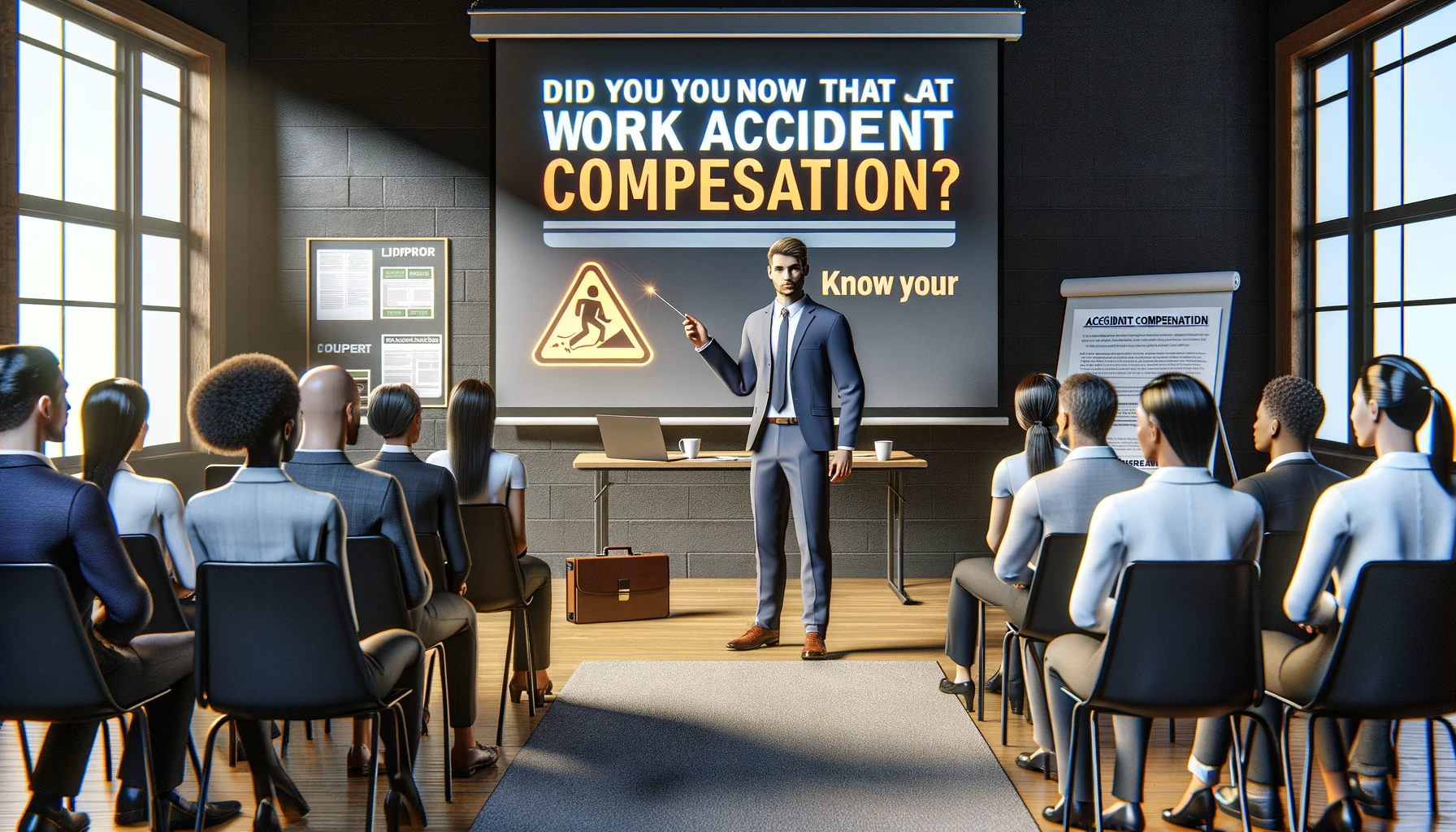Experiencing an accident at work can be a disorienting and stressful event. It's crucial to understand the impact it may have on your life and the steps you need to take immediately after. Knowing what to do, not only helps in your recovery, but also ensures that your rights are protected. Let's dive into the essential actions you should take following a workplace injury.


Immediate Steps After Injury at Work
If you've suffered an injury on the job, the first thing to do is assess the injury. Don't downplay any discomfort or pain, as some symptoms might only become apparent hours or even days later. Your health is the top priority, so seeking medical attention immediately is vital. This is not just for your well-being, but it also serves as an official record of the incident.
Reporting Work Accidents
Once you're safe and have received initial medical care, it's time to report the accident. This should be done as soon as possible, adhering to your company's employee accident protocol. Documentation is critical; make sure to provide a clear account of the incident and keep copies of all reports for your records. This will be invaluable for any future claims or investigations.Workers' Compensation Process
Navigating the workers' compensation process can be complex. Familiarize yourself with your employer's policy and the steps needed to file a claim. This process is designed to provide financial assistance for medical bills and lost wages, so it's important to understand what to expect and meet all deadlines.Employee Accident Protocol
Both employers and employees have responsibilities when it comes to workplace accidents. Employer responsibilities include maintaining a safe work environment and handling injury reports properly. As an employee, it's your responsibility to follow the established occupational accident procedures and cooperate with any investigations.On-the-Job Injury Advice
The aftermath of an injury can be overwhelming, but there are job site accident follow-up tips that can help. Keep communication lines open with your employer and be honest about your recovery progress. It's essential to follow all post-accident medical care advice and attend all follow-up appointments.Work Injury Recovery
Recovery from a work injury might require both short-term and long-term plans. This might include physical therapy, counseling, or modified work duties. Take care of your physical and mental health; don't rush back to work before you're ready, as this can lead to further injury.Post-Accident Action Plan
After an injury, you'll need to create a post-accident action plan. This includes a strategy for your return to work and ensuring that workplace safety guidelines are reinforced to prevent future incidents. Engage in open dialogue with your employer about any necessary changes to your work environment.
After-Work Injury Rights
It's crucial to understand your after-work injury rights. You are entitled to a safe workplace and the right to file a workers' compensation claim without fear of retaliation. If necessary, seek legal advice to ensure that your rights are upheld throughout the process.Workers' Compensation and Legal Rights
Workers' compensation is a crucial aspect of dealing with a workplace injury. These benefits are designed to provide financial support and medical care to employees who are injured on the job. Understanding your rights and the workers' compensation process is vital to ensure you receive the help you need. In most states, employers are required to carry workers' compensation insurance to cover employees in case of work-related injuries or illnesses. However, the process of obtaining these benefits can be complex, and it's essential to navigate it correctly. The following steps provide a more detailed explanation of what to do following a workplace injury:- Assess the Injury Immediately: As mentioned earlier, your health is the top priority. Assess the extent of your injury and seek medical attention promptly. Even seemingly minor injuries should be examined by a healthcare professional, as some conditions may not manifest symptoms right away.
- Report the Accident: Once you have received medical attention and are safe, report the accident to your employer or supervisor following your company's established procedures. Prompt reporting is essential, as it helps create an official record of the incident.
- Document the Incident: Provide a clear and detailed account of how the accident occurred. Include information such as the time, location, and any contributing factors. If there were witnesses, make note of their names and contact information. Keeping records of all communications related to the accident is crucial.
- Seek Medical Care: Follow the advice and treatment plan prescribed by your healthcare provider. Attend all necessary follow-up appointments and adhere to your recommended course of care. This not only supports your recovery but also provides essential medical documentation for your workers' compensation claim.
- Familiarize Yourself with Workers' Compensation: Take the time to understand your employer's workers' compensation policy. Know the specific steps required to file a claim and any relevant deadlines. Workers' compensation benefits typically cover medical expenses, lost wages, and disability benefits, but the details may vary by state and employer.
- File a Workers' Compensation Claim: If your injury requires medical treatment or time away from work, you may be eligible for workers' compensation benefits. To start the process, inform your employer of your intention to file a claim. They should provide you with the necessary forms to initiate your claim.
- Consult Legal Counsel: If you encounter difficulties with your workers' compensation claim, such as denial of benefits or disputes with your employer or their insurance carrier, it may be wise to seek legal advice. An attorney experienced in workers' compensation can help you understand your rights and options.
- Know Your Rights: Familiarize yourself with your rights as an employee who has suffered a work-related injury. You have the right to a safe workplace, protection against retaliation for filing a workers' compensation claim, and the right to pursue legal action if your rights are violated.
- Plan Your Return to Work: Depending on the severity of your injury, you may need to create a post-accident action plan for your return to work. This may involve discussions with your employer about modified duties, workplace accommodations, or a gradual return to full work responsibilities.
- Promote Workplace Safety: After experiencing a workplace injury, consider engaging in open dialogue with your employer about ways to reinforce workplace safety guidelines. Your insights can help prevent future incidents and ensure a safer work environment for all employees.
Conclusion
Experiencing a workplace injury can be physically, emotionally, and financially challenging. However, understanding your rights and taking the appropriate actions can significantly impact your recovery and ensure you receive the support you need. Remember, your health and well-being should always be your top priorities. By promptly assessing and reporting the injury, seeking medical attention, and documenting the incident, you create a strong foundation for any workers' compensation claim. Familiarizing yourself with your legal rights and consulting with legal counsel if necessary can help you navigate the complexities of the workers' compensation process. Additionally, promoting workplace safety and engaging in constructive dialogue with your employer can contribute to a safer work environment for you and your colleagues. Stay informed, be proactive, and prioritize your health and recovery to achieve the best possible outcome following a workplace injury.Look for an attorney who has the right legal resources for your legal needs.
Contact us here on the Warmuth Law website or through our hotline 888-517-9888.











